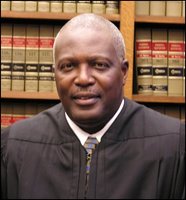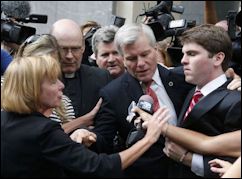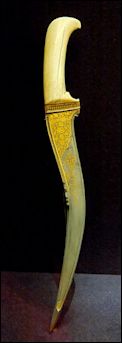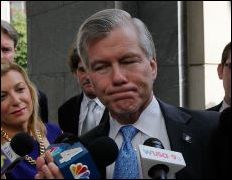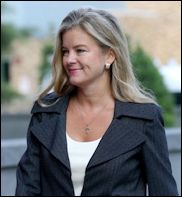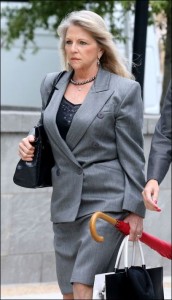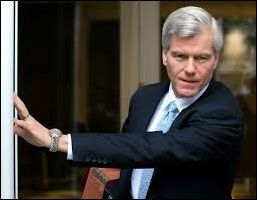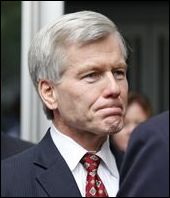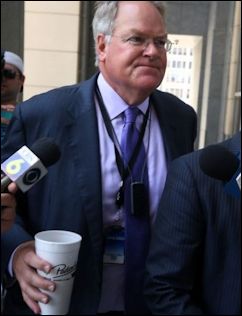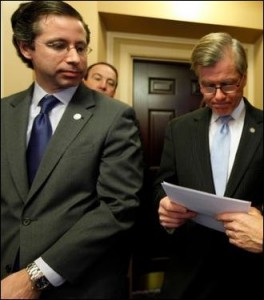
Baron von Munchausen, famous spinner of tall tales
Jonnie Williams’ trial testimony about a critical meeting with the former governor was contradictory, implausible and sometimes incoherent. But the jury bought it anyway.
Peter G.’s skeptical response to the op-ed I co-authored with Paul Goldman and Mark Rozell is exactly what I would have expected, given the fact that we had to boil a complex argument with abundant support documentation down to 750 words. Accordingly, what follows is an expanded version of that column. However, I take the argument further than Goldman and Rozell may be comfortable taking it, so I assume sole responsibility for this piece. — JAB
In closing statements of former Governor Bob McDonnell’s August trial, lead prosecutor Michael Dry made a remarkable statement. McDonnell had flat-out denied key testimony of star witness Jonnie R. Williams, a suspected con man under federal investigation who had agreed to testify in exchange for a generous immunity agreement. Dry acknowledged that jurors might suspect that Williams had lied. But then he argued, “Who cares?” The jury could “discount everything, every single word uttered by Mr. Williams,” he said, and it wouldn’t matter. There still remained a mountain of evidence to prove the government’s case that McDonnell and his wife had used their status to obtain $138,804 in gifts and loans from Williams.
“Who cares” if Mr. Williams lied? The jurors apparently did not; they found the governor guilty on all counts, his wife on nine. But Virginians should care. When Mr. and Mrs. McDonnell are sentenced for their convictions early next year, they may well be sentenced to jail time, and the amount of time will be determined in part by the number of counts for which they were convicted. If some of those convictions were obtained from tainted testimony, they will be punished excessively and unjustly.
Virginians also should care about the lengths to which a Democratic Attorney General’s office was willing to go to win a conviction against a popular Republican governor. Prosecutors put forth as a witness a man whose narrative evolved over some ten meetings with the FBI and federal prosecutors, whose story about a key encounter with McDonnell changed within the trial itself. Indeed, law enforcement officials had every reason to question his story themselves. If they won their convictions through tainted testimony, is that really the way Virginians want the rule of law to work?
Government’s key witness
Serial entrepreneur and Star Scientific Inc. founder Jonnie Williams had been fined in the 1980s by the Securities and Exchange Commission, and he remained on the federal government’s scam radar. At Star Scientific, he peddled the promise of developing a “safer cigarette.” When that futile quest collapsed, he claimed to have discovered a miracle compound, anatabine – as big as penicillin — that potentially could fight Alzheimer’s and other diseases linked to inflammation. But he faced a steep climb to gain acceptance. Virginia’s secretary of health and human services, among others, dismissed the product as “worthless.”
Unbeknownst to the public, the First Couple was struggling financially with crushing credit card debt and underwater real estate investments in Virginia Beach. Prosecutors argued that the McDonnells engaged in a conspiracy to trade the prestige and support of the Governor’s office for Williams’ gifts and loans. The McDonnells hosted a luncheon praising Anatabloc in August of 2011 at the Governor’s Mansion. The First Lady spoke at Star investor conferences across the country. The Governor popped Anatabloc at official meetings and helped set up meetings with state government officials.
For all the documentation the feds had gathered, however, they lacked “smoking gun” proof of a quid pro quo. McDonnell argued that he did no more for Star Scientific than he would for any promising Virginia company. Prosecutors needed Williams to provide evidence of a tacit conspiracy to trade favors for gifts.
The first time investigators interviewed him, Williams described the McDonnells as friends. He denied trying to buy influence with his loans. He praised the Governor’s integrity. But the government ratcheted up the pressure, probing into potential insider trading transaction involving Star Scientific stock. The second time he met with investigators, they granted him “use” immunity, which prevented his testimony from being used against him. Williams then said there was a “wink and a nod” agreement to exchange gifts and favors. In a meeting shortly before the trial, the government offered “transactional” immunity that protected him from other offenses, including the insider-trading probe. His story changed yet again. This time, he said, he was never friends with Maureen and Bob McDonnell. Their dealings were business transactions, and they knew they were exchanging gifts for favors.
Accordingly, prosecutors made the following keystone charge, upon which much of the rest of the case would hinge, in its indictment:
Before agreeing to provide the requested financial assistance to the defendants, JW [Jonnie Williams] spoke directly with ROBERT MCDONNELL about the $50,000 loan. In that conversation, ROBERT MCDONNELL explained the defendant’s financial difficulties. ROBERT MCDONNELL informed JW that the rental income from the defendants’ rental property in Virginia Beach was not covering the bills for those properties. JW agreed to provide the $50,000 loan with a two-year term at 5% interest. JW also informed ROBERT MCDONNELL that loan paperwork was not necessary.
Williams later admitted in court that the deal freed him “from worrying about going to jail.” Legal experts were hard pressed to remember other instances of prosecutors granting such broad immunities in a corruption case.
Shifting story
May 2, 2011, was a key date in the prosecution’s conspiracy timeline. The prosecution alleged and the defense did not dispute that Williams and Mrs. McDonnell met at the Governor’s Mansion. Mrs. McDonnell revealed the family’s credit-card and rental-property issues to Williams, and Williams agreed to give her a $50,000 personal loan and to cover $15,000 in catering costs for daughter Cailin’s upcoming nuptials.
The other key date was May 23, 2011, the day that Williams delivered the two checks. It happened to be his wedding anniversary, and he and his wife Celeste were planning to have lunch at the Jefferson Hotel. Williams dropped by the Governor’s Mansion on the way to deliver one check for the catering company and another made out to Mrs. McDonnell. Williams and his wife stayed about an hour and fifteen minutes, he testified at one point. “We went upstairs and had a salad.”
Why, the defense asked, did he make out the $50,000 check to Maureen McDonnell? Because, he testified, that’s to whom she said to make it out to.
Federal anti-corruption law applies to elected or appointed public officials. As First Lady, Mrs. McDonnell was neither elected nor appointed. She was a private citizen. While it was wildly inappropriate in the eyes of the public for her to offer Williams her services in exchange for the $65,000, it was not illegal. To demonstrate a conspiracy that involved McDonnell, prosecutors had to show that the Governor knew about the arrangement at the time. Continue reading →

